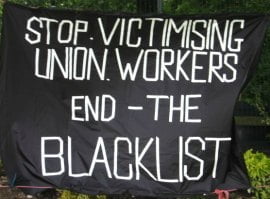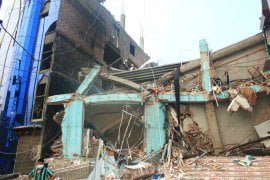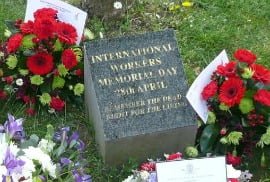Yesterday, on April 28th 2015, commemoration ceremonies were held across the world as part of International Workers Memorial Day to honour workers killed at work or who had died from illnesses contracted during their working life. Darrall Cozens looks at the dangers of work under capitalism.
At midday yesterday, on April 28th 2015, in towns and cities up and down the country, commemoration ceremonies were held to honour workers killed at work or who had died from illnesses contracted during their working life. Today was International Workers Memorial Day and ceremonies were held all over the world.
The day coincided with a Midlands TUC conference on Health and Safety jointly organised with Derbyshire Asbestos Support Group, Thompsons Solicitors and Asbestos Support West Midlands. The scheduled guest speaker was Steve Murphy, General Secretary of UCATT, who would break off from the conference to speak at a commemoration rally at in the grounds of St. Phillips Cathedral in the city centre.
In Coventry it was no different. Coventry TUC organised the rally held at midday in the Workers Memorial Garden at the side of the Council House. It was presided over by the CTUC President. Speakers included the Lord Mayor, as well as trade union representatives from the NUT, Unison, the Labour Council and Unite the Union.
All the speakers stressed the importance of fighting at the workplace to ensure that Health and Safety legislation was abided by and that trade unions were unhindered in carrying out their work to defend their members.
Health and safety under threat
As each day dawns, millions of workers leave their homes to go to work to create the wealth that all societies depend on. They do it to feed and clothe and give shelter to their families and loved ones. Yet when they leave for work there is no guarantee that they will return home at the end of the day.
Health and Safety Executive (HSE) figures for 2013/14 show that, nationally, 133 workers were killed at work, more than 78,000 were injured, some 2,535 died from mesothelioma due to being exposed to asbestos while at work, and 1.2 million were off work due to work related illnesses. The Labour Force Survey paints a grimmer picture in terms of numbers: during the same period there were 629,000 injuries at work, 28.2 million working days lost from illnesses, and injuries sustained at a cost of £14.2bn.
In Coventry, the local paper, the Coventry Telegraph, published an article on January 17th this year which stated that workplace deaths and injuries were on the rise. In the Coventry area in 2013/14 there were 3 deaths and 1,348 injuries, with 12,800 at home with work related illnesses. In 2013/13 there were no deaths and 1,321 injuries. During the same period of 2013/14 in the West Midlands there were twelve fatalities at work and only sixty seven cases prosecuted by the HSE or local authorities.
Statistics, however, hide the human cost. The same paper reported that in July 2104, at a firm called RSM Industries in Exhall just outside Coventry, a worker lost three and a half fingers and half of his palm from a machine that the company had twelve chances to check if it was safe to use. The worker underwent 35 hours of surgery in seven different operations resulting in the loss of use of the dominant hand. The firm was fined £8,000, with £11,000 in costs.
Safety at work is supposed to be governed by legislation and training, but this only happens if legislation is enforced and training given. The massive cut in the number of factory inspectors gives little confidence that employers will enforce the law. It was reported in April of last year that an ex-Labour adviser, Baroness Donaghy, had warned of a massive increase in construction industry deaths – since 2001 some 760 had died – due to a 35% cut in the HSE budget by 2014/15.
A separate 80-page report in September 2012 by Stirling University “blames a steep rise in major workplace injuries on deep cuts in funding, staff, inspections and enforcement. Just one in 20 major injuries are now investigated by the HSE, and only one in 170 results in prosecution.” The report continues:
“Over the past five years the number of major and fatal injuries at work in the UK has increased by 2700 per year, the report says. In the same period, the proportion investigated by HSE has fallen from 8% to 5%, while those prosecuted dropped from 1% to 0.6%.
“The HSE’s budget has been cut by 13% from £228 million in 2009-10 to £199m in 2011-12, with further cuts planned. Its staff numbers have been reduced by 22% from 3702 in 2010 to 2889 in June this year.”
Big Brother and the blacklisting bosses
 The Crossrail Project in London is an example of the conditions that workers face. A report by independent consultants MindSafety called “Cultural Overview – Crossrail Project” shows that workers are afraid to report accidents for fear of being laid off. Workers feel that they are under ‘Big Brother’, with the Crossrail Managers watching and documenting their every move in an attempt to ‘catch them out.’
The Crossrail Project in London is an example of the conditions that workers face. A report by independent consultants MindSafety called “Cultural Overview – Crossrail Project” shows that workers are afraid to report accidents for fear of being laid off. Workers feel that they are under ‘Big Brother’, with the Crossrail Managers watching and documenting their every move in an attempt to ‘catch them out.’
There is a culture of fear and “individuals cannot move and work freely as they are constantly looking over their shoulders and in fear of reprisals”, so that when an accident happens “these workers are keeping mum about such failures in fear of disciplinary action and ridicule from their peers – with reports taking a negative angle and focusing on finger pointing rather than education and solutions”.
The report identifies the death of one worker, “Rene Tkacik, 43, who was fatally struck by a falling slab of concrete on March 7. At the time of his death he was spraying concrete through a hose – known as “shotcrete” – in a process introduced by Crossrail contractors last year. A whistleblower has now told how giant boulders of concrete had fallen and a number of people were injured in the months before Rene’s death.” Crossrail claims that its safety record is “better than the UK construction industry average.”
Is it just a coincidence that the campaign about the blacklisting of building industry workers as a result of files kept by The Consulting Association, set up in 1993 in Droitwich as a successor to the Economic League, was financed by twenty construction companies? Some 3,200 trade unionists, shop stewards and health and safety reps were prevented from working in the building industry as a result of files kept on them; files that had information provided by, among others, the police in the National Extremism Tactical Coordination Unit and, to the shame of the labour and trade union movement, some trade union officials.
International attacks on workers
 It must also be remembered that today was an international event. It was revealed last week that the $30m fund, set up to compensate the families of more than 1,100 workers killed in the Rana Plaza factory in Bangladesh in April 2013, was still $9m short. Last week Benneton finally paid in $1.1m to the fund after an Awaaz petition had attracted the same number of signatures. Calls have also been made on Mango, Walmart and Carrefour to pay more.
It must also be remembered that today was an international event. It was revealed last week that the $30m fund, set up to compensate the families of more than 1,100 workers killed in the Rana Plaza factory in Bangladesh in April 2013, was still $9m short. Last week Benneton finally paid in $1.1m to the fund after an Awaaz petition had attracted the same number of signatures. Calls have also been made on Mango, Walmart and Carrefour to pay more.
There has, however, been little improvement in working conditions with workers reporting incidents of physical assault, verbal abuse, forced overtime, insanitary conditions, denial of paid maternity leave and failure to pay wages and bonuses on time or in full. It is no surprise that less than 300 of the 3,500 clothing manufacturers have trade unions. There were proposals to set up workers’ committees to oversee factory safety, but to date the government has not set in motion the required legislation. That may be due to the fact that 80% of Bangladesh’s foreign earnings come from that clothing industry. And at a time of austerity in the West and cuts in real wages, there is a high demand for cheap clothes from countries like Bangladesh.
Yesterday too there was a call from the leader of the National Union of Metalworker in South Africa for the results of the Commission of Enquiry into the August 2012 massacre of 24 miners to be made public. They had been shot by the police when they were on strike to try and achieve a monthly wage of 12,500 Rand, about £700. The enquiry finished in January of this year, but so far its results have not been published. The miners were demanding wage rises to compensate for the horrendously unsafe working conditions. In post-Apartheid South Africa you can die at work or be shot by the forces of the state while taking industrial action. For the majority of black workers, therefore, very little has changed under a black government that still maintains the rule of capital.
Race to the bottom
In the UK, the coming week will see heightened electoral activity in the run up to May 7th. However, whichever party forms the next government, the results will be the same – as long as there is capitalism, the cuts agenda will continue and attempts will be made to cut the costs of production, especially labour costs, to try and stimulate the economic recovery. Emphasis will be laid on what is termed “supply side” measures – the removal of so-called “barriers” to economic growth.
Included in these are rights at work that have been won through decades of struggle. The Tories in particular call these rights “red tape” that has to be removed; hence the increasing attacks on trade unions and their representatives. So we have a barrage of propaganda about the “namby pamby” state, the “compensation culture”, the “costs” of trade union representation – resulting in attacks on facility time, on “check-off” (union subs deductions at source), on union recognition, on 40% voting rules before industrial action can be undertaken.
In the race to the bottom, in the drive to cut costs and therefore corners, the prospect of death and/or serious injury at work will increase dramatically, as it is only the trade unions that – in the final analysis – have the power to enforce protective measures to defend workers.
Our trade unions and the leaderships therefore have a choice to make. Do they keep their heads down in the hope that the crisis will go away and we can return to “normal times”; or do they stand and fight to defend the gains made by working people over decades – gains in wages, terms and conditions, and safety at work? And if the system of capitalism in decline cannot guarantee these gains, then the system has to be changed.
The usual slogan used on Workers Memorial Day is: “Remember the dead, fight for the living”. This year in the Midlands it has been beefed up to reflect the times we live in: “Remember the dead, fight like hell for the living”. That should be our motto!






